Think you’ve downloaded a highly anticipated movie in MKV format and met with an error message on playback. It's a common scenario for anyone who hasn’t set up the right codec MKV support on their system. To avoid this situation in the future, consider a proper MKV codec guide that serves as a backstage pass to flawless media enjoyment.
In this article, we will cover everything from how to install and configure the codec, so your video plays smoothly. When you keep on reading, you’ll discover the best 5 MKV codecs that are available in the market. Besides, a proper guide is provided to help you understand how to install an MKV codec on Windows. Finally, an ultimate repair program will be introduced to fix corrupted MKV files.
Table of Contents
Part 1. MKV Codec Explained: Everything You Need to Know
Instead of directly diving into MKV video codecs, first, you need to know what an MKV file is and how it works. To get you sorted, the following section outlines everything you need to know, from the definition to a comparison between different formats:
What is an MKV File?
An MKV file is an abbreviation of Matroska Video and is a multimedia container that can contain multiple video tracks or metadata. Indeed, it is a digital wrapping that has the capacity to carry HD videos, lossless music, and subtitle tracks in various languages. While it's just a container and a codec itself, proper playback relies on having the correct MKV video codec installed to decode its content.
Why Do You Need an MKV Codec?
Besides decoding MKV content, the following reasons better explain why you need MKV video codec support:
- While opening MKV files, this codec prevents errors, lag, or missing audio/video files.
- It makes sure users have access to embedded subtitles, multiple audio tracks, and chapters.
- The codecs even maintain original video resolution and audio fidelity without unnecessary compression.
- They facilitate smooth MKV editing and a hassle-free format conversion without any glitches.
- MKV codec keeps your system ready to handle newer MKV encodings and evolving multimedia standards.
Tabular Comparison Between MKV vs. MP4 vs. AVI
After knowing the literal meaning of the MKV file and the need for the MKV video codec, let's compare this format with other popular formats available:
| Features | MKV | MP4 (MPEG-4) | AVI |
| Codec Support | Very wide: H.264, H.265, VP9, AV1; audio and more. | Wide, but more restricted than MKV | Limited, designed for older codecs (MPEG-2, DivX, etc.) |
| Quality & Features | High-quality, flexibility to store lossless video/audio. | Supports high-quality video, but optimized for efficient compression | Can store good video, but lacks support for advanced features |
| File Size | Usually larger due to support for lossless compression | Typically, smaller than MKV with the same codec/settings | Inefficient due to overhead and old compression schemes |
| Compatibility | Not universally supported; may not play on older devices/platforms | Extremely compatible across devices | Supported on Windows and older media players |
| Use Cases | Used in high-resolution sharing, storing DVD/ Blu-ray backups with multiple languages/subtitles. | Preferred for streaming, web, and social media | Useful for fundamental video storage and editing on older systems. |
Part 2. 5 Best MKV Codecs You Can Download in 2025
While saving your time for hunting the suited codec MKV, we’ve rounded up the best programs below for your needs:
1. VLC Media Player (Built-in MKV Support)
As a free-source, open multimedia platform, VLC is the top choice for users requiring seamless playback on Windows, Mac, or Linux. Its internal codec library decodes any format stored within an MKV, such as H.264 or H.265/HEVC. The program handles all major codecs, enabling users to open MKV files without any external installation. On VLC, you can play MKV files up to UHD 4K/8K, including multiple subtitle streams.
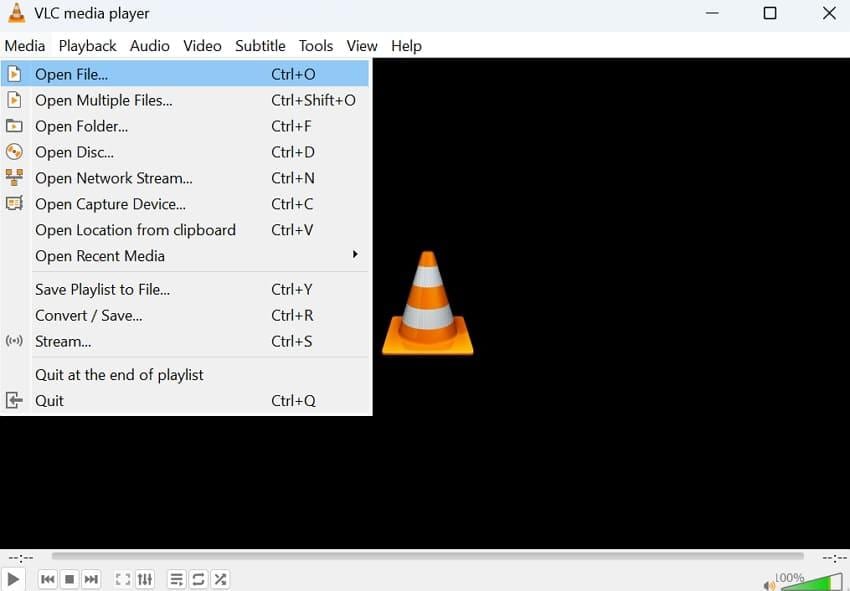
2. K-Lite Codec Pack
This codec, MKV, Windows Media Player comes in several editions, including Basic, Standard, Full, and Mega, each for different needs. Even the Basic version supports continuous playback of MKV files, designed with built-in MKV decoders and DirectShow. It gives its users the option of determining the codecs and filters to be included, eliminating outdated components. The application allows playing multiple audio tracks, embedded/external subtitles, and Blu-ray/DVD playback in MKV.
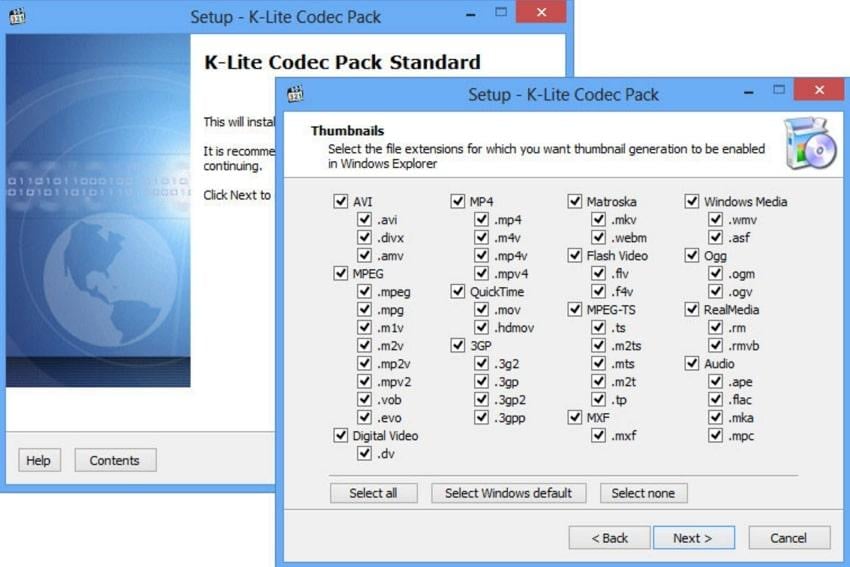
3. CCCP (Combined Community Codec Pack)
Another codec video MKV that includes integration of Media Player Classic Home Cinema (custom build) and VSFilter for subtitle handling. The core video and audio decoding are handled by optimized builds of ffdshow and LAV filters. It further offers a user control panel for easy filter management and one-click reset of user settings for multi-track MKV files. CCCP is a lightweight codec and is compatible with Windows XP, Vista, 8, and more.
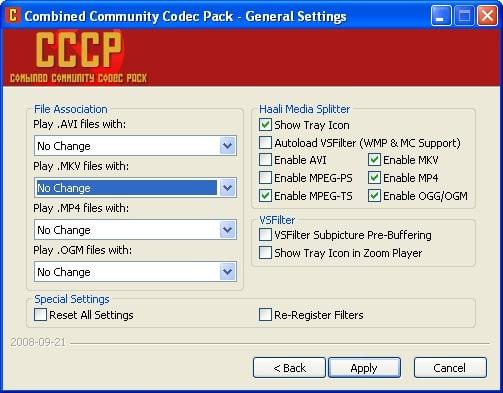
4. Haali Media Splitter
It's the MKV video codec that acts as a bridge between MKV files and Windows media players, providing support for subtitle tracks and multiple audio streams. Once installed, it can be used with Windows Media Player to play high-resolution videos. The splitter enables you to browse through chapters of an MKV container or play incompletely downloaded files. Its compact resource footprint and avoidance of codec bloat make it convenient among codec packs like CCCP.
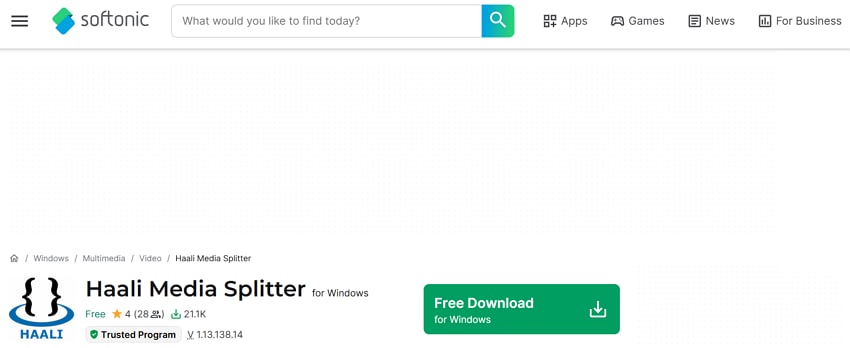
5. Media Player Codec Pack
Media Player Codec Pack is a reputable free software bundle for Windows, made to expand the capabilities of media players. After installation, users can gain instant support for MKV containers encoded with nearly all relevant compression standards. This codec, MKV, includes splitters, filters, and decoders such as LAV, ffdshow, and XviD/X264. It further leverages hardware detection and adapts codec settings for optimal playback performance on NVIDIA or Intel GPUs.
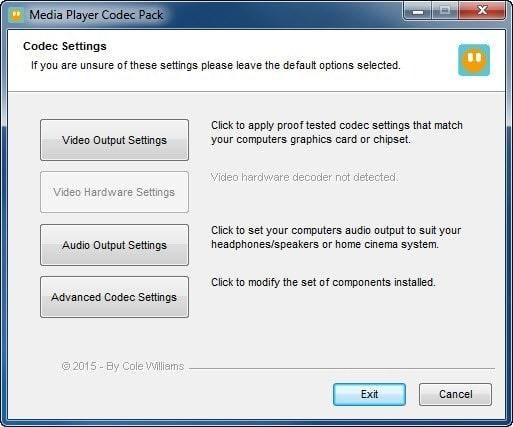
Part 3. How to Install an MKV Codec on Windows? A Quick Guide
You might have understood now that one of the easiest ways to enable MKV video codec support on Windows is by installing K-Lite Codec Pack. To know how to proceed, follow the manual provided below for its installation and get sorted:
Step 1. First, visit the official K-Lite Codec Pack website and click the “Download Standard” button to begin the download. Under the Download section, choose “Server 1” in the Location section to start the process of downloading.
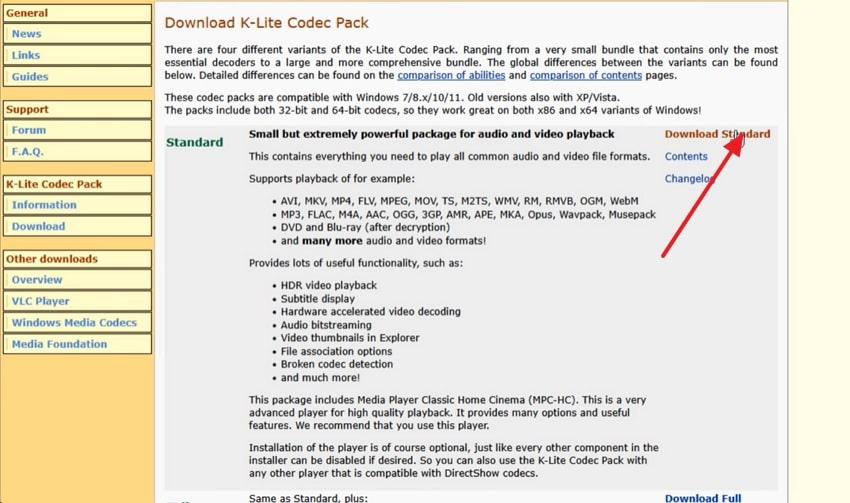
Step 2. In the Installation Mode screen, select the “Normal” mode and navigate to the “Next” button at the bottom right corner. After this, follow the on-screen instructions and specify all the settings according to your preferences.
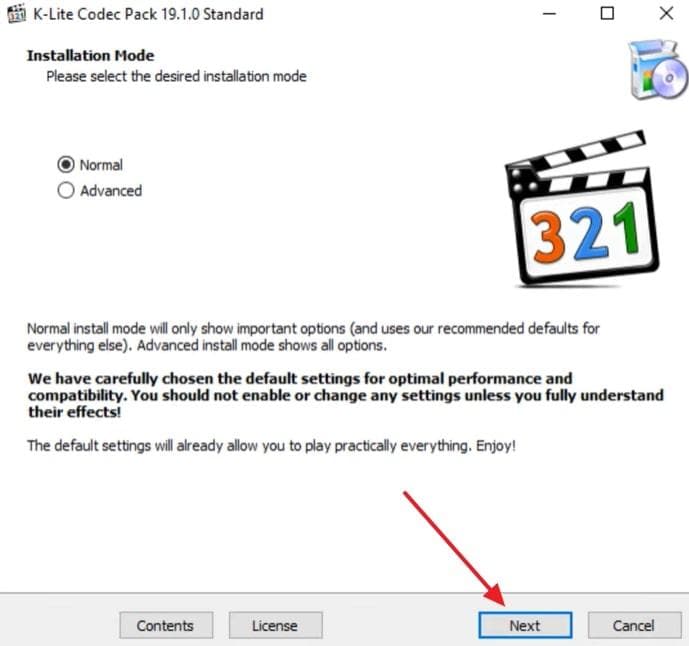
Step 3. Upon reaching Installation Preferences, expand the menu for “Preferred Video Player” and choose one from the options. Once done, proceed to the “Next” button and enter the Ready for Installation screen.
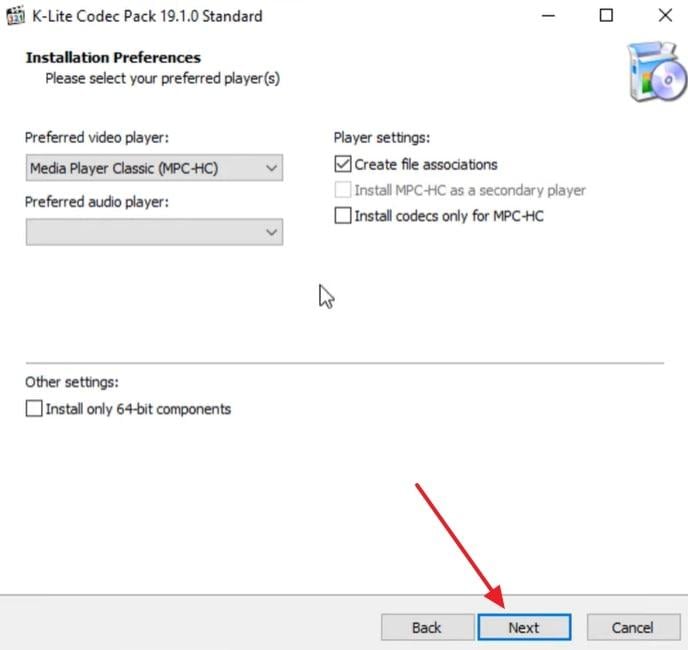
Step 4. When you’re done setting up the codec, head to the “Install” button in the bottom right corner and begin installation.
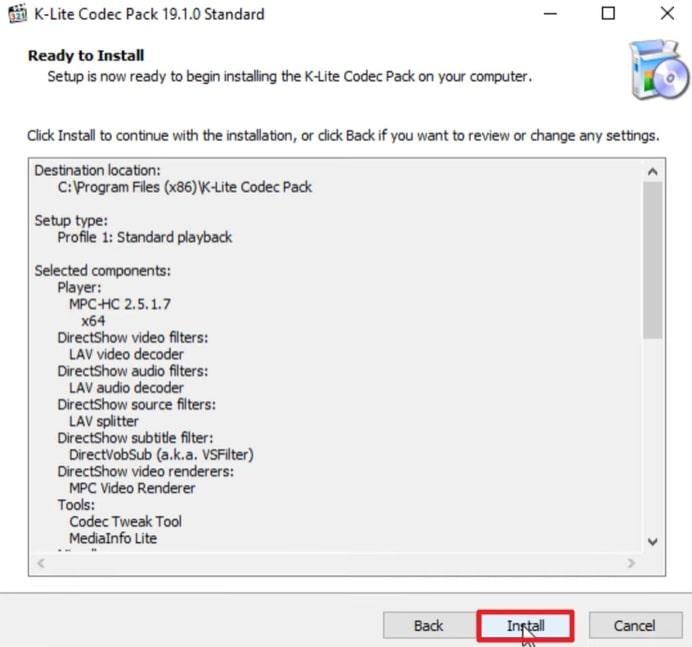
Part 4. How to Play & Convert MKV Without Installing a Codec
Those who want to skip the manual hassle of installing a video codec for MKV and still want to enjoy flawless playback, Wondershare UniConverter serves as a savior. Its built-in player is designed to play MKV videos in various resolutions on both Windows and Mac. Besides, users can even leverage hardware acceleration for uninterrupted high-bitrate MKV files. It means you can view MKV content, edit segments, and convert videos all within a single platform.
Beyond playing MKV, the program is a notable all-around video converter and supports over 1000 formats for conversion. It even allows batch processing and a 30X faster hardware-accelerated export option to streamline the workflow. Overall, users can get lossless conversions, subtitle editing, and video trimming/cropping altogether. To know how it converts your MKV files into a more stable format, follow the provided tutorial:
Step 1. Deploy the program and press the “Add Files" button in the Converter section provided on the main interface. Following this, insert your desired MKV video file into the program for conversion.
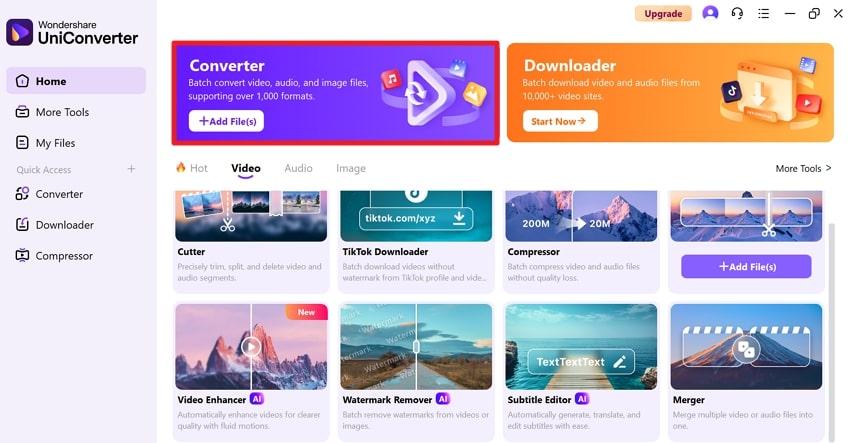
Step 2. From the Converter screen, press the “Settings” icon at the bottom and access the “Video” tab. Now, choose the “MP4” format from the options and hit the “Convert All” button to begin the conversion.
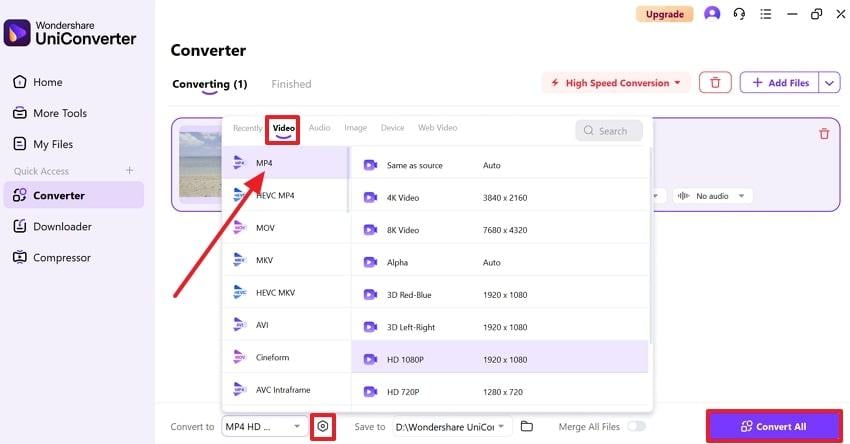
Part 5. Repair Corrupted or Damaged MKV Files
Instead of getting into fixing codec MKV files, explore the following reasons to understand why they are corrupt at first:
- When the network drops or a sudden interruption occurs during the file transfer, it can leave MKV incomplete.
- A massive range of faulty media storage or bad sectors on hard drives can damage your MKV file data.
- Without an appropriate MKV video codec, the files may not decode correctly, leading to major playback errors.
- The file can be damaged indirectly, even by shutting down a system or device in which an MKV is playing or is being processed.
- An MKV file can be compromised or altered when a system is attacked by malware or a virus.
When any of the above-discussed issues corrupt your MKV file, remember that it doesn’t mean the end of your video. You can refer to platforms like Repairit Video Repair to restore your MKV videos. The software is designed to repair corrupted files under any damage scenario and works seamlessly with almost all video formats, including mainstream, device-specific, and pro-level codecs. Before saving, you can even preview the repaired MKV file to ensure everything is fixed correctly.
Despite giving up on your codec video, MKV, adhere to the provided step-by-step manual and repair corruption instantly:
Step 1. Download the software, enter the “Video Repair” module, and press the “Start” button to insert all the damaged MKV videos.
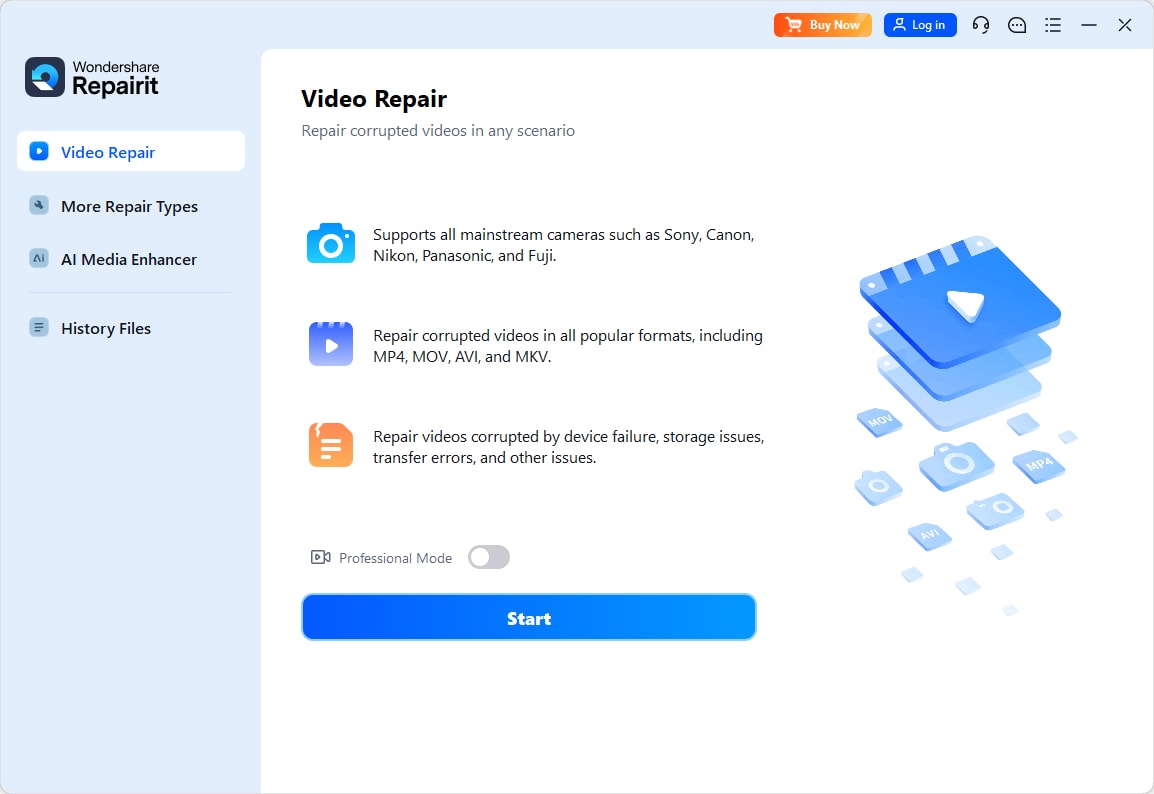
Step 2. Once done adding videos, navigate to the “Repair” button at the bottom right corner and begin repairing the corrupted MKV files.
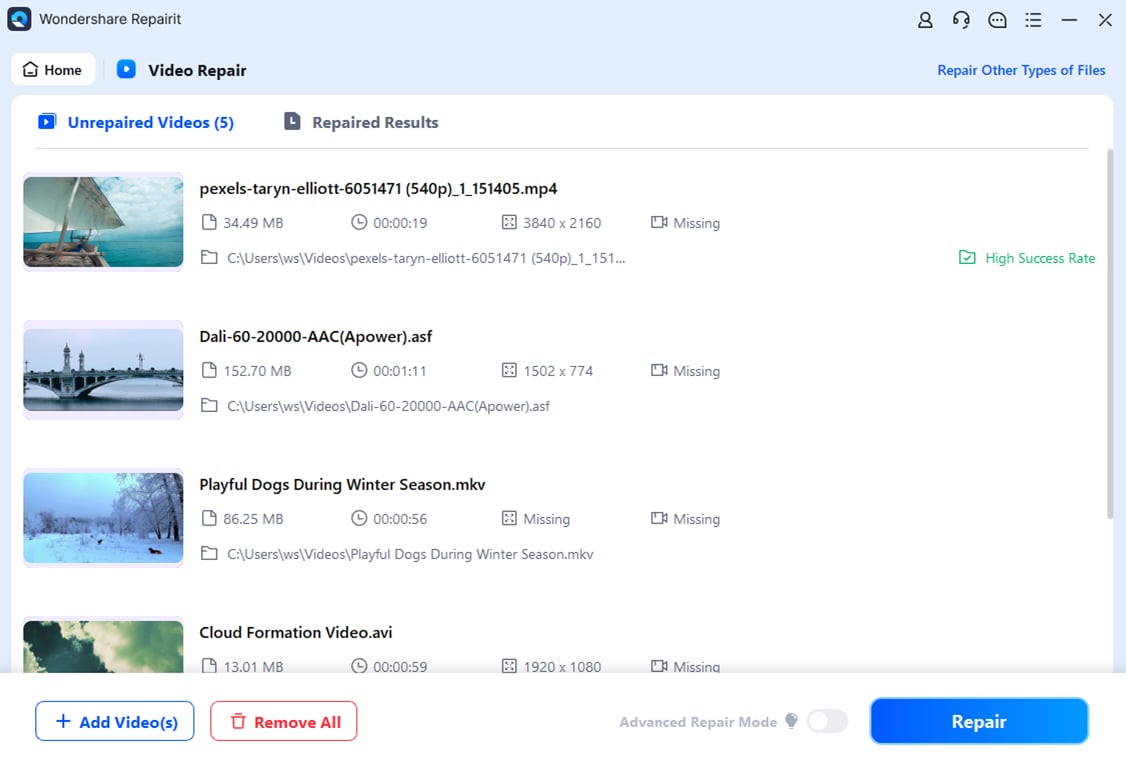
Step 3. As soon as the repair action completes, press the “Preview” button from the prompt window to view repaired MKV files and save them all later.
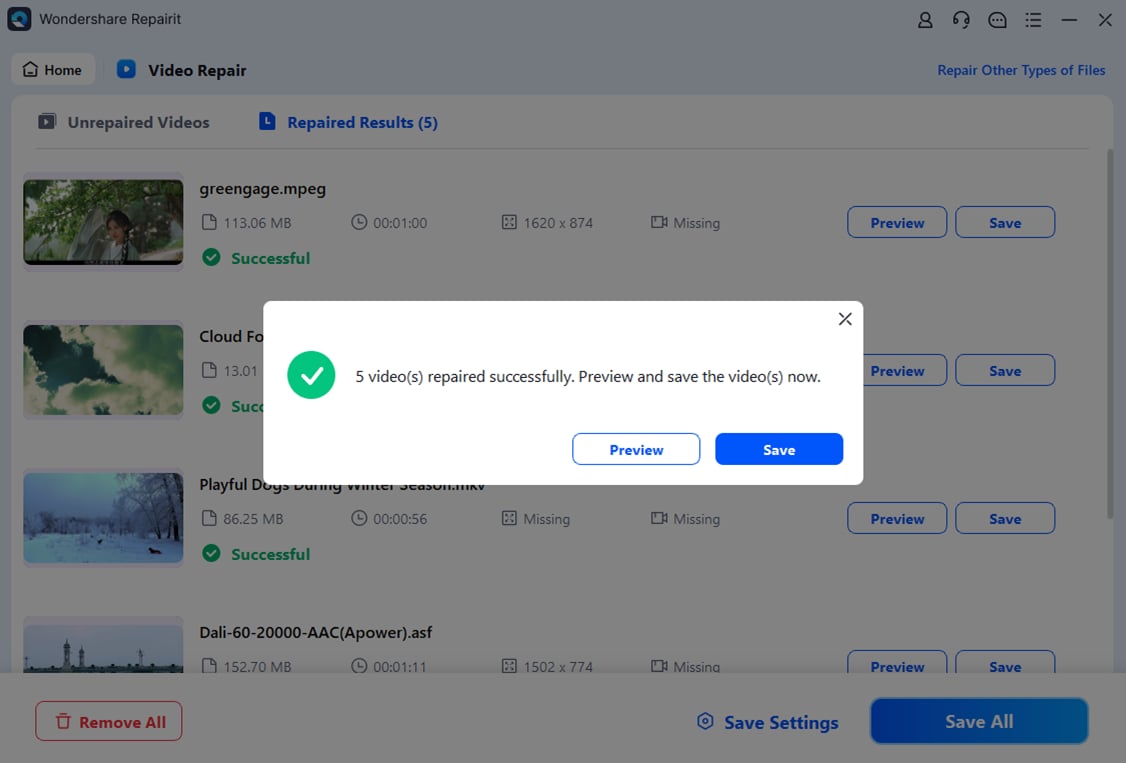
Repair Corrupted or Damaged MKV Files

Conclusion
To conclude, mastering the correct codec MKV setup is your ticket to enjoying MKV files exactly as they were meant to be seen. In the article above, we’ve covered everything essential, starting from the basic definition of MKV files to installing and conversion processes. Anyhow, even the best setup can’t always protect your videos from unexpected corruption, giving rise to the need for a program like Repairit.
Frequently Asked Questions
-
Q1. How do I know which MKV codec I need?
It is based on the encoding format within the MKV container since it's merely a container that can contain different video and audio codecs. You can check the file properties in your media player or with a professional program to get a clear picture of what codecs are used. Once you know that, you can install the codec you need specifically, or use a universal codec pack that supports a range of files. -
Q2. Are MKV codecs free to download?
Absolutely, the majority of popular MKV video codecs, including K-Lite and CCCP, can be downloaded and used at no cost. These packs are usually updated frequently to make sure they are compatible with the new video standards and formats. Simply download them from the official site to prevent malware, unnecessary programs, or old versions that may create playback problems. -
Q3. Can missing codecs cause video lag or no audio in MKV files?
A lack of or obsolete MKV video codec files may cause delays, stuttering playback, or missing audio tracks when playing. This occurs when your media player is not able to correctly decode the video or audio streams contained within the MKV container. On other occasions, you may receive videos with no sound or sound with no video, depending on the missing codec.
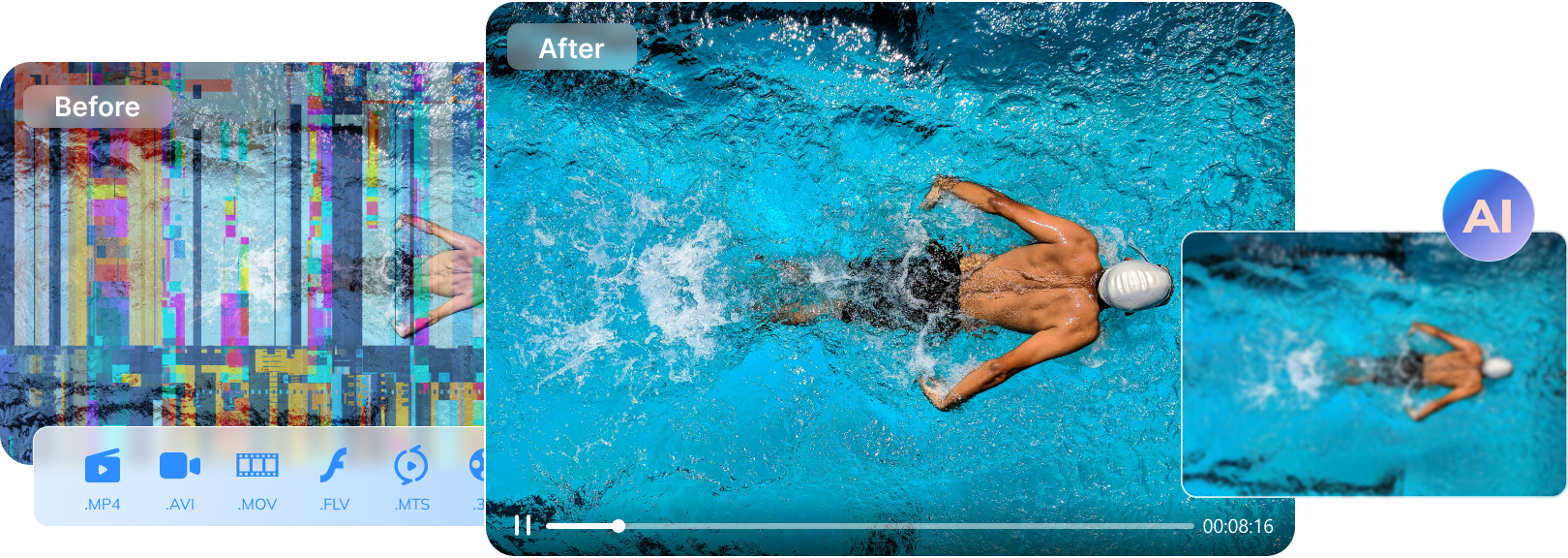

 ChatGPT
ChatGPT
 Perplexity
Perplexity
 Google AI Mode
Google AI Mode
 Grok
Grok

